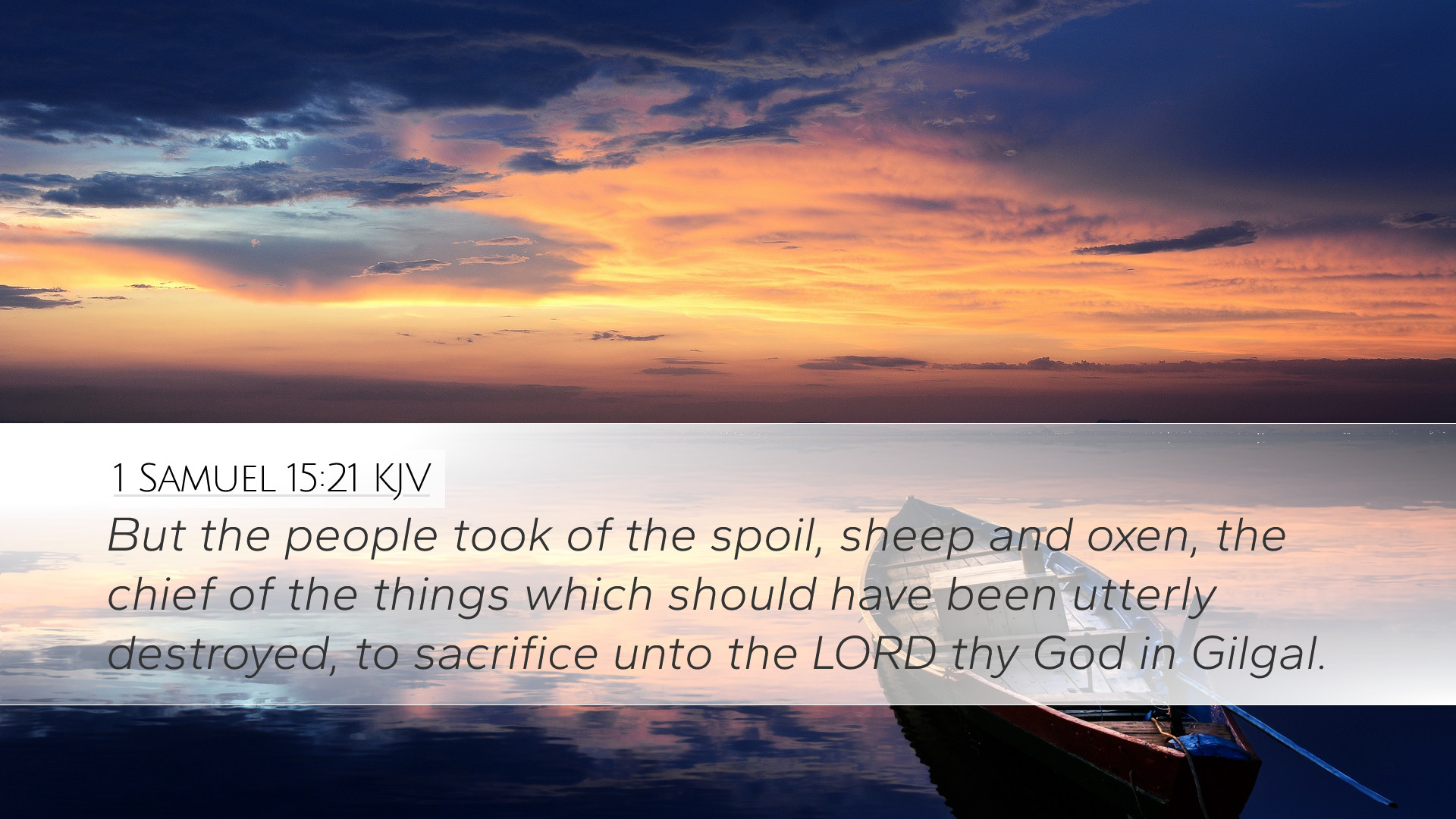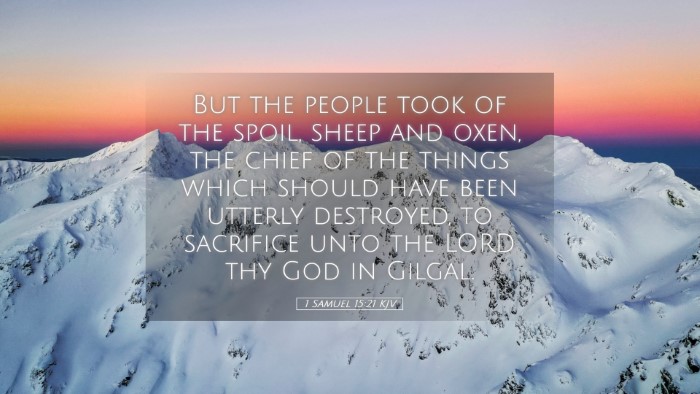Commentary on 1 Samuel 15:21
This verse serves as a pivotal moment in the narrative of Saul’s kingship, highlighting the consequences of disobedience to God's commands. Here, we explore insights from various public domain commentaries, shedding light on the theological implications and moral lessons embedded in this scripture.
Verse Text
1 Samuel 15:21: "But the people took of the spoil, sheep and oxen, the chief of the things which should have been utterly destroyed, to sacrifice unto the Lord thy God in Gilgal."
Contextual Overview
This verse occurs in the broader context of God’s command to Saul to utterly destroy the Amalekites. Saul, however, disobeys this command, leading to significant theological reflections regarding the nature of obedience and sacrifice.
Matthew Henry’s Commentary
Matthew Henry notes that the people, stirred by their desires, chose to take the spoils instead of obeying God’s command. His insights emphasize:
- The Dangers of Popular Opinion: Saul, influenced by the people’s voices, strayed from God's intention. This serves as a cautionary tale for leaders who may prioritize public approval over divine guidance.
- The Nature of Sacrifice: Henry elucidates that the intention behind the sacrifices was flawed, as they prioritized outward acts of worship over true obedience to God's word. He argues that God desires obedience more than sacrifices.
Albert Barnes’ Notes
Albert Barnes provides a thorough examination of the intent behind the people’s actions. He emphasizes:
- Justification of Disobedience: The people believed that their sacrifices would compensate for their disobedience. Barnes indicates that this rationale is fundamentally flawed, revealing a misunderstanding of God’s requirements.
- The Role of Sacrifices: Barnes concurs with the idea that while sacrifices were a vital part of worship in Israel, they should never replace obedience. He cites scriptural support to reinforce that God values a contrite heart over mere ritual.
Adam Clarke’s Commentary
Adam Clarke delves deeper into the implications of the people's actions. His commentary highlights:
- Covenant Relationship: Clarke posits that the act of taking spoils shows a breach in the covenant relationship with God. He argues that their willingness to “sacrifice” what they had plundered ironically contradicted God’s explicit command.
- Understanding of Holiness: Clarke elaborates on the principle that everything God commands is rooted in His holiness. The people’s decision to spare the best livestock they intended to offer as sacrifices undermined the concept of being set apart for God.
Theological Reflections
This verse prompts several theological reflections pertinent to contemporary audiences:
- Obedience vs. Sacrifice: The debate between ceremonial observance and genuine obedience resonates within the church today. True worship hinges on responsiveness to God’s commands rather than mere ritual observance.
- Human Justification: The tendency to justify disobedience through “good intentions” is a recurring issue. As believers, self-examination is crucial in discerning our motivations in serving God.
- The Nature of Leadership: For pastors and leaders, this episode serves as a reminder to stand firm on God’s word, even against popular opinion. Leadership should be rooted in integrity and faithfulness to God’s revelations.
Practical Applications
Insights from this verse can provide practical guidance for personal and corporate faith practices:
- Prioritize Obedience: Encourage congregants to prioritize obedience to Scripture over personal desires or societal expectations.
- Evaluate Intentions: Regularly investigate personal motives when engaging in religious practices. This self-awareness can deepen one’s relationship with God.
- Foster a Culture of Accountability: Leaders should cultivate an environment where accountability to God’s commands is encouraged and celebrated.
Conclusion
1 Samuel 15:21 serves as a sobering reminder of the call to obedience over ritualistic practices. Through the lenses of respected commentators such as Matthew Henry, Albert Barnes, and Adam Clarke, we gain important insights that challenge us to reflect deeply on our relationship with God and the authenticity of our worship. This passage encourages a recommitment to align our lives entirely with His will, empowering us to live out our faith authentically.


